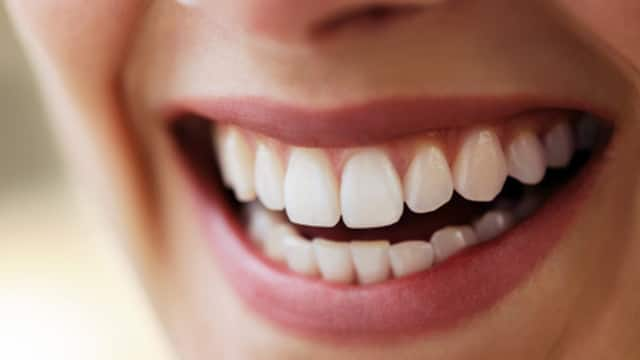Why Are My Teeth Sensitive After A Cleaning?
Teeth sensitivity happens when the dentin, which is the layer beneath your enamel, becomes exposed due to receding gums. Remember—your roots don’t have enamel to protect them, so anything that comes in contact with them may cause sensitivity, like dental tools. While several factors contribute to tooth sensitivity, dental cleanings are a known cause, as your dental care professional may probe your gums and use tools that contact-sensitive areas of your teeth.
Deep Cleaning
Not every dental visit will involve a deep cleaning, but your teeth may also feel sensitive afterward if you do receive this procedure. The Ministry of Family and Health Welfare explains that scaling and root planing, also called as deep cleaning is a treatment used to treat periodontal (gum) diseases. Scaling involves thoroughly removing all the plaque, bacterial toxins and tartar deposits from teeth and root surfaces and then root planing, which smoothes all rough areas on root surfaces. Smooth root surfaces keep bacteria, plaque and tartar from re-adhering underneath the gumline, allowing gums to heal and reattach themselves more firmly. Bacteria in plaque cause gums to be inflamed and swollen. When this layer accumulates under the gums, tissues that support the teeth may get affected and thus, the signs of periodontal disease in the form of pockets, bleeding from gums, mobility of teeth are evident. Planing is when they smooth out your teeth’s roots to help your gums reattach to your teeth.
Before a deep-cleaning session, the gums may be inflamed and swollen or have deep pockets infected with bacteria. Both scaling and root planing help treat these problems, but this treatment can hurt your teeth after the cleaning due to natural discomfort and bleeding. The dentist may offer a local anaesthetic if your deep cleaning is likely to be more irritating.
What Happens Next?
It’s normal to experience sensitivity after a deep cleaning, which can last up to a week. Soreness and pain may also linger for a few days as your gums may be swollen or bleed. Your oral care provider may prescribe an antibiotic or mouth rinse to manage any pain and fight any possible infections.
Caring for Deep-Cleaned Teeth
Taking good care of your teeth after a deep cleaning treatment helps your gums heal by reducing the common triggers of pain and sensitivity. Wait at least a day before flossing, and brush your teeth carefully with a soft-bristled toothbrush while your gums are still sore. Use toothpaste for sensitive teeth to help treat and prevent tooth sensitivity, and avoid eating foods or drinking liquids that set off your sensitivity. If your teeth are sensitive three or four weeks after treatment or you have other concerns, contact your dentist for a follow-up visit. He or she can check that your gums are healing well.
How to Avoid Teeth Sensitivity
One way to avoid teeth sensitivity after a deep cleaning is to look for ways to improve your current day-to-day oral care routine. In addition to brushing twice a day with a soft-bristle toothbrush and fluoride toothpaste and flossing daily, avoid aggressive or hard scrubbing when brushing. You should also try to avoid acidic foods and drinks, which can lead to enamel deterioration (though using a straw can help mitigate that risk, as well as drinking water after an acidic beverage). If you grind your teeth, your oral care professional can provide you with a mouthguard that can protect you from grinding down your teeth and causing sensitivity.
While the sensation of feeling sensitivity in your teeth feels uncomfortable, it’s normal to feel it after a cleaning, and it’s usually temporary. But if your symptoms last longer than a few weeks, you should contact your oral care provider to talk about your concerns.
Remember—teeth cleanings (and deep cleanings) are easy & excellent ways to maintain great oral health and prevent cavities. Even though your teeth might be sensitive after a cleaning, don’t worry. It’s normal and temporary, and soon you’ll be on your way to a healthier smile.
This article is intended to promote understanding of and knowledge about general oral health topics. It is not intended to be a substitute for professional advice, diagnosis or treatment. Always seek the advice of your dentist or other qualified healthcare provider with any questions you may have regarding a medical condition or treatment.
ORAL HEALTH QUIZ
What's behind your smile?
Take our Oral Health assessment to get the most from your oral care routine
ORAL HEALTH QUIZ
What's behind your smile?
Take our Oral Health assessment to get the most from your oral care routine











